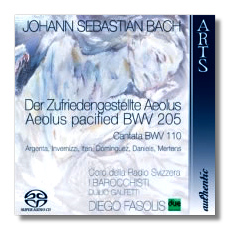
The Internet's Premier Classical Music Source
Related Links
- J.S. Bach Reviews
- Latest Reviews
- More Reviews
-
By Composer
-
Collections
DVD & Blu-ray
Books
Concert Reviews
Articles/Interviews
Software
Audio
Search Amazon
Recommended Links
Site News
 SACD Review
SACD Review
Johann Sebastian Bach

- Cantata #205, "Der Zufriendengestellte Aeolus"
- Cantata #110, "Under Mund sei voll Lachens" *
Nancy Argenta, soprano
Claudia Iten, mezzo-soprano
* Roberta Invernizzi, soprano
* Dominguez, mezzo-soprano
Charles Daniels, tenor
Klaus Mertens, bass
Coro della Radio Svizzera, Lugano
I Barocchisti/Diego Fasolis
Arts 47717-8 Hybrid Multichannel SACD 57:15
The sound of laughter can be heard in both of these cantatas, albeit in very different contexts. In Cantata #205, the wind-god Aeolus gloats over the prospect of destruction and chaos. In #110, the chorus sings that their mouths should be full of laughter because the Lord has "achieved great things" – namely, the advent of Jesus. In both cases, Bach, with typical genius, treats the word Lachen (laughter) descriptively, even differentiating between the coarse laughter of Aeolus and the joyous laughter of the Christian faithful.
Cantata #205 is one of Bach's less well-known secular cantatas. "Aeolus Pacified" was composed in 1725 in honor of a popular professor at the University of Leipzig, Dr. August Friedrich Müller. Aeolus gleefully anticipates unleashing his wintry winds on the unfortunate earth, and the opening chorus is a textually ("Zerreisset, zersprenget, zertrümmert die Gruft") and musically dramatic portrait of those winds. Zephyrus (tenor) comes and begs Aeolus to delay the wintry blast. Pomona (mezzo-soprano) then reminds him of her fruity bounty, and Pallas Athene, the goddess of wisdom, also adds her plea. At last, Pallas mentions that her dear August Müller is being celebrated today, so couldn't Aeolus please back off for his sake? This does the trick. Everyone is happy, and the chorus closes by singing "Vivat August, August vivat." This probably was as funny in Bach's time as it is today, and the composer treated the subject with mock seriousness, albeit with as much care as he gave to any other work of his. The opening chorus is tremendously exciting, and Aeolus comes off as a (literal) blow-hard. The arias for Zephyrus, Pomona, and Pallas are gracious and (especially in the case of the aria for Zephyrus) contain much that is interesting and almost pictorially descriptive.
A few months later, Bach composed Cantata #110, probably for use in Leipzig's Thomaskirche, to celebrate the Christmas season. Although Christmas itself is never mentioned, the text is full of allusions to God's gift to mankind. Again, there is an opening chorus of great virtuosity (this time, derived from the opening movement of Bach's Fourth Orchestral Suite), and several arias that while tender, can hardly contain their feelings of joy. Again, this is not one of Bach's most popular cantatas, but there is nothing inferior about it.
Fasolis has conducted I Barocchisti (an instrumental ensemble) since 1988 and the Coro della Radio Svizzera since 1993. With these musicians, he has made several recordings of Bach's music for the Arts label; this one dates from 2003 (#110) and 2004 (#205). The chorus has a little over 30 members, which is a good size for this music, if one wants to balance authenticity with sonic impact. They make light of the music's difficulties, singing with joyous energy, admirable precision, and appropriate Baroque style. As for the soloists, they get right into the spirit of these works, and one feels that they find exactly the correct tone for Cantata #205… that is, one eye winking, and the other eye serious. Argenta is particularly lovely in this work, but everyone sings characterfully. (Not with ego, however.) While Fasolis likes fast tempos, they do not seem rushed, and the singing and playing are clean. Drama and story-telling both get the upper-hand in these exhilarating performances. Even on a conventional CD player, the quality of the sound is very exciting. Arts's booklet includes full texts and translations. After sampling this SACD, I can't imagine a listener not wanting to explore other Bach titles conducted by Fasolis.
Copyright © 2007, Raymond Tuttle




















